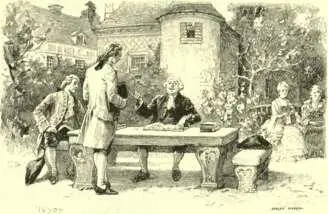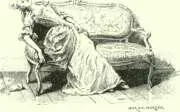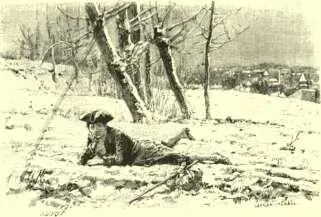CHAPTER I. HOW CANDIDE QUITTED HIS COMPANIONS, AND WHAT HAPPENED TO HIM.
CHAPTER II. WHAT BEFELL CANDIDE IN THIS HOUSE — HOW HE GOT OUT OF IT.
CHAPTER III. CANDIDE’S RECEPTION AT COURT AND WHAT FOLLOWED.
CHAPTER IV. FRESH FAVORS CONFERRED ON CANDIDE; HIS GREAT ADVANCEMENT.
CHAPTER V. HOW CANDIDE BECAME A VERY GREAT MAN, AND YET WAS NOT CONTENTED.
CHAPTER VI. THE PLEASURES OF CANDIDE.
CHAPTER VII. THE HISTORY OF ZIRZA.
CHAPTER VIII. CANDIDE’S DISGUSTS — AN UNEXPECTED MEETING.
CHAPTER IX. CANDIDE’S DISGRACES, TRAVELS, AND ADVENTURES.
CHAPTER X. CANDIDE AND PANGLOSS ARRIVE AT THE PROPONTIS — WHAT THEY SAW THERE — WHAT BECAME OF THEM.
CHAPTER XI. CANDIDE CONTINUES HIS TRAVELS.
CHAPTER XII. CANDIDE STILL CONTINUES HIS TRAVELS — NEW ADVENTURES.
CHAPTER XIII. THE HISTORY OF ZENOIDA — HOW CANDIDE FELL IN LOVE WITH HER.
CHAPTER XIV. CONTINUATION OF THE LOVES OF CANDIDE.
CHAPTER XV. THE ARRIVAL OF WOLHALL — A JOURNEY TO COPENHAGEN.
CHAPTER XVI. HOW CANDIDE FOUND HIS WIFE AGAIN AND LOST HIS MISTRESS.
CHAPTER XVII. HOW CANDIDE HAD A MIND TO KILL HIMSELF, AND DID NOT DO IT — WHAT HAPPENED TO HIM AT AN INN.
CHAPTER XVIII. CANDIDE AND CACAMBO GO INTO A HOSPITAL — WHOM THEY MEET THERE.
CHAPTER XIX. NEW DISCOVERIES.
CHAPTER XX. CONSEQUENCE OF CANDIDE’S MISFORTUNE — HOW HE FOUND HIS MISTRESS AGAIN — THE FORTUNE THAT HAPPENED TO HIM.
Table of Contents

CHAPTER I.
HOW CANDIDE WAS BROUGHT UP IN A MAGNIFICENT CASTLE AND HOW HE WAS DRIVEN THENCE.
Table of Contents
In the country of Westphalia, in the castle of the most noble baron of Thunder-ten-tronckh, lived a youth whom nature had endowed with a most sweet disposition. His face was the true index of his mind. He had a solid judgment joined to the most unaffected simplicity; and hence, I presume, he had his name of Candide. The old servants of the house suspected him to have been the son of the baron’s sister, by a very good sort of a gentleman of the neighborhood, whom that young lady refused to marry, because he could produce no more than threescore and eleven quarterings in his arms; the rest of the genealogical tree belonging to the family having been lost through the injuries of time.
The baron was one of the most powerful lords in Westphalia; for his castle had not only a gate, but even windows; and his great hall was hung with tapestry. He used to hunt with his mastiffs and spaniels instead of greyhounds; his groom served him for huntsman; and the parson of the parish officiated as his grand almoner. He was called My Lord by all his people, and he never told a story but every one laughed at it.
My lady baroness weighed three hundred and fifty pounds, consequently was a person of no small consideration; and then she did the honors of the house with a dignity that commanded universal respect. Her daughter was about seventeen years of age, fresh colored, comely, plump, and desirable. The baron’s son seemed to be a youth in every respect worthy of the father he sprung from. Pangloss, the preceptor, was the oracle of the family, and little Candide listened to his instructions with all the simplicity natural to his age and disposition.
Master Pangloss taught the metaphysico-theologo-cosmolo-nigology. He could prove to admiration that there is no effect without a cause; and, that in this best of all possible worlds, the baron’s castle was the most magnificent of all castles, and my lady the best of all possible baronesses.
It is demonstrable, said he, that things cannot be otherwise than as they are; for as all things have been created for some end, they must necessarily be created for the best end. Observe, for instance, the nose is formed for spectacles, therefore we wear spectacles. The legs are visibly designed for stockings, accordingly we wear stockings. Stones were made to be hewn, and to construct castles, therefore My Lord has a magnificent castle; for the greatest baron in the province ought to be the best lodged. Swine were intended to be eaten, therefore we eat pork all the year round: and they, who assert that everything is right, do not express themselves correctly; they should say that everything is best.
Candide listened attentively, and believed implicitly; for he thought Miss Cunegund excessively handsome, though he never had the courage to tell her so. He concluded that next to the happiness of being baron of Thunder-ten-tronckh, the next was that of being Miss Cunegund, the next that of seeing her every day, and the last that of hearing the doctrine of Master Pangloss, the greatest philosopher of the whole province, and consequently of the whole world.
One day when Miss Cunegund went to take a walk in a little neighboring wood which was called a park, she saw, through the bushes, the sage Doctor Pangloss giving a lecture in experimental philosophy to her mother’s chambermaid, a little brown wench, very pretty, and very tractable. As Miss Cunegund had a great disposition for the sciences, she observed with the utmost attention the experiments, which were repeated before her eyes; she perfectly well understood the force of the doctor’s reasoning upon causes and effects. She retired greatly flurried, quite pensive and filled with the desire of knowledge, imagining that she might be a sufficing reason for young Candide, and he for her.
On her way back she happened to meet the young man; she blushed, he blushed also; she wished him a good morning in a flattering tone, he returned the salute without knowing what he said. The next day, as they were rising from dinner, Cunegund and Candide slipped behind the screen. The miss dropped her handkerchief, the young man picked it up. She innocently took hold of his hand, and he as innocently kissed hers with a warmth, a sensibility, a grace — all very particular; their lips met; their eyes sparkled; their knees trembled; their hands strayed. The baron chanced to come by; he beheld the cause and effect, and, without hesitation, saluted Candide with some notable kicks on the breech, and drove him out of doors. The lovely Miss Cunegund fainted away, and, as soon as she came to herself, the baroness boxed her ears. Thus a general consternation was spread over this most magnificent and most agreeable of all possible castles.


CHAPTER II.
WHAT BEFELL CANDIDE AMONG THE BULGARIANS.
Table of Contents
Candide, thus driven out of this terrestrial paradise, rambled a long time without knowing where he went; sometimes he raised his eyes, all bedewed with tears, towards heaven, and sometimes he cast a melancholy look towards the magnificent castle, where dwelt the fairest of young baronesses. He laid himself down to sleep in a furrow, heartbroken, and supperless. The snow fell in great flakes, and, in the morning when he awoke, he was almost frozen to death; however, he made shift to crawl to the next town, which was called Wald-berghoff-trarbk-dikdorff, without a penny in his pocket, and half dead with hunger and fatigue. He took up his stand at the door of an inn. He had not been long there, before two men dressed in blue, fixed their eyes steadfastly upon him. “Faith, comrade,” said one of them to the other, “yonder is a well made young fellow, and of the right size.” Upon which they made up to Candide, and with the greatest civility and politeness invited him to dine with them. “Gentlemen,” replied Candide, with a most engaging modesty, “you do me much honor, but upon my word I have no money.” “Money, sir!” said one of the blues to him, “young persons of your appearance and merit never pay anything; why, are not you five feet five inches high?” “Yes, gentlemen, that is really my size,” replied he, with a low bow. “Come then, sir, sit down along with us; we will not only pay your reckoning, but will never suffer such a clever young fellow as you to want money. Men were born to assist one another.” “You are perfectly right, gentlemen,” said Candide, “this is precisely the doctrine of Master Pangloss; and I am convinced that everything is for the best.” His generous companions next entreated him to accept of a few crowns, which he readily complied with, at the same time offering them his note for the payment, which they refused, and sat down to table. “Have you not a great affection for —” “O yes! I have a great affection for the lovely Miss Cunegund.” “May be so,” replied one of the blues, “but that is not the question! We ask you whether you have not a great affection for the king of the Bulgarians?” “For the king of the Bulgarians?” said Candide, “oh Lord! not at all, why I never saw him in my life.” “Is it possible! oh, he is a most charming king! Come, we must drink his health.” “With all my heart, gentlemen,” says Candide, and off he tossed his glass. “Bravo!” cry the blues; “you are now the support, the defender, the hero of the Bulgarians; your fortune is made; you are in the high road to glory.” So saying, they handcuffed him, and carried him away to the regiment. There he was made to wheel about to the right, to the left, to draw his rammer, to return his rammer, to present, to fire, to march, and they gave him thirty blows with a cane; the next day he performed his exercise a little better, and they gave him but twenty; the day following he came off with ten, and was looked upon as a young fellow of surprising genius by all his comrades.
Читать дальше















